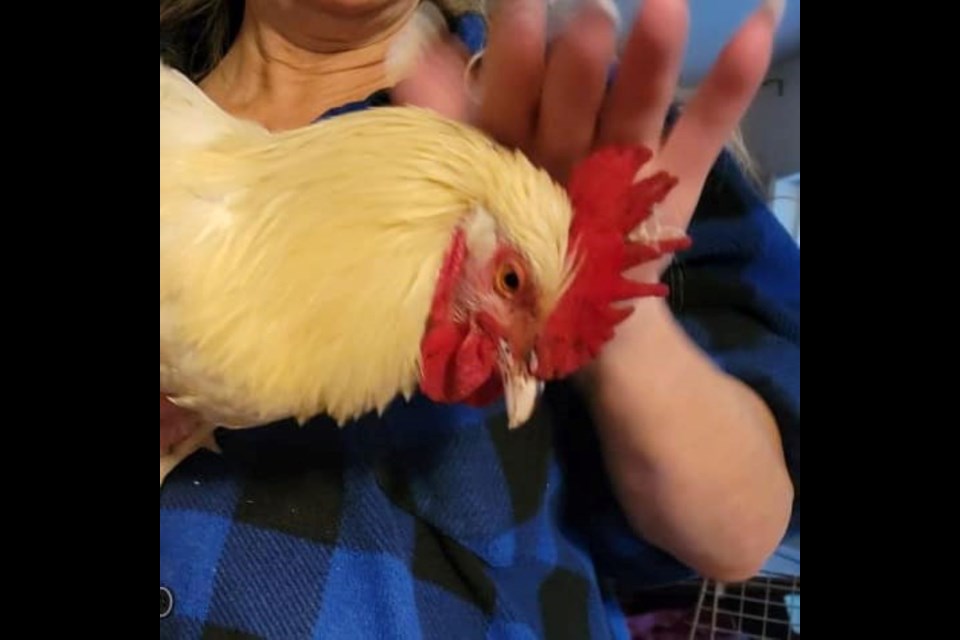A Roberts Creek woman who operates a rescue farm sanctuary, says inexperienced backyard farmers are dropping unwanted roosters in wilderness areas, basically leaving them to die.
Yvonne Lewis, a paramedic who operates Kitchensink Rescue Farm and Sanctuary with her husband, Mike Lewis, says a rooster dumped in a park or on a logging road, which is what happened last week, will be scared, cold and likely attacked by a coyote, raccoon, bear or bird of prey.
“If I take one of our roosters and put him at the farthest end of our farm, by the time it’s starting to get dark, he’ll make his way back to his coop and that’s where he’ll spend the night,” says Lewis, who adds the farm cares for a group of roosters, which were found at the top of Roberts Creek Road on a logging road.
“I've had endless calls about roosters dumped in the power lines in West Sechelt and dumped on many forest service roads but unless someone sees the roosters and catches them, they don’t have a chance.”
Lewis says, even if they’re found and caught, the problem then becomes, what do you do with them? She says that’s when these good Samaritans either give her a call or reach out to Tammy Trefry from Coastal Wildlife Rescue or the Gibsons Wildlife Rehabilitation Centre. She calls the problem "preventable."
“These animals didn't ask to be born. This was somebody's idea, without looking into it or getting themselves educated, before deciding to have roosters or backyard chickens and letting them hatch,” says Lewis. “And it’s so sad. They’re left in the cold, in the wet and there are coyotes and other birds. They have no place to go. Chickens have a set safety plan at night, so as soon as dusk comes, they go to their coop. They want to be covered. They would be stressed, because roosters want to go into sleep mode and they want to hide and be safe. They can't do that once they've been dumped from their environment.”
Last week, a woman walking her dog on Menacher Road in Pender Harbour, used largely as a logging road, watched as a woman driving a white Honda Civic, stopped and dropped off two roosters before driving away. The witness was walking her two large dogs, so wasn’t able to immediately grab the roosters, but reported what she saw to Coastal Wildlife Rescue.
In the meantime, a logging truck driver spotted and rescued one of the roosters, which had already been attacked and badly injured.
Trefry says the injured bird was bleeding and had lost most of its feathers, but was still alive.
“This logging driver came down and he was just devastated. Here's this big burly guy and he said, ‘I already have it in my truck. It's bleeding. Its feathers are mostly missing, but it’s still alive.’ So, we had our volunteers go, but sadly, it didn't make the night.”
Volunteers did manage to rescue the second rooster, which has a potential home in the Okanagan, but needs a ride. Trefry says livestock rescue is a growing concern across Canada, with roosters leading the charge.
She adds, also of issue is people dumping domesticated ducks and geese into waterways where wild fowl live. In those cases, she says, the domesticated fowl often out-weight the wild birds.
“You know, they can hang out for a while. But when breeding season comes, they'll drown the other male ducks or they'll drown the female trying to impress her,” Trefry says. “It’s a brutal. They attack, but they don't mean to. They're not being mean, but it's just a nightmare. So, Yvonne is always our first stop.”
Lewis has Muscovy ducks at her farm, which were rescued after someone dumped them near the wharf in Gibsons. She notes the breed can’t even fly, so would have been stuck there after all the other water fowl had migrated for winter. She wants to stress to anyone considering starting a backyard farm with birds of any kind, to do their research, including a search of their municipality’s bylaws to ensure chickens are allowed. In some municipalities chickens are allowed, while roosters are not, but it’s hard to distinguish one from the other until they’re about four months old, which is often too late for anyone who simply purchased chicks in hopes they’re all female layers.
“You shouldn’t even think about having chickens in your yard unless you have a plan for the roosters, because my sanctuary can’t be your plan, the Wildlife Centre in Gibson's can't be your plan. We cannot take endless mistakes made by other people,” says Lewis. “I would love to be able to have a rooster sanctuary with 1,000 roosters because I’m absolutely obsessed with them. I think they are just the most wonderful creatures in the world, but I can't safely take them all. And it just seems like there's no responsibility taken by the people who are causing the problem.”
Lewis says she gets heartbreaking emails from backyard famers who suddenly realize they’ve got roosters, but after four months, have grown attached to them so don’t want to kill them.
“They say, ‘We have raised these chickens. They are lovely. We love these roosters. They're so personable,’” says Lewis. “And, I acknowledge that, but still cannot take endless roosters.”
She notes, many people aren’t aware birds feel pain and suffering.
“But they do. They are very social. They have a network. They have feelings, they grieve, they are happy, they’re sad, just like any other creature,” says Lewis. “And they don't deserve that fate and it's a completely human-created problem. The saddest part is, it's avoidable, the suffering and the fear is all avoidable if humans didn't create the problem in the first place.”



